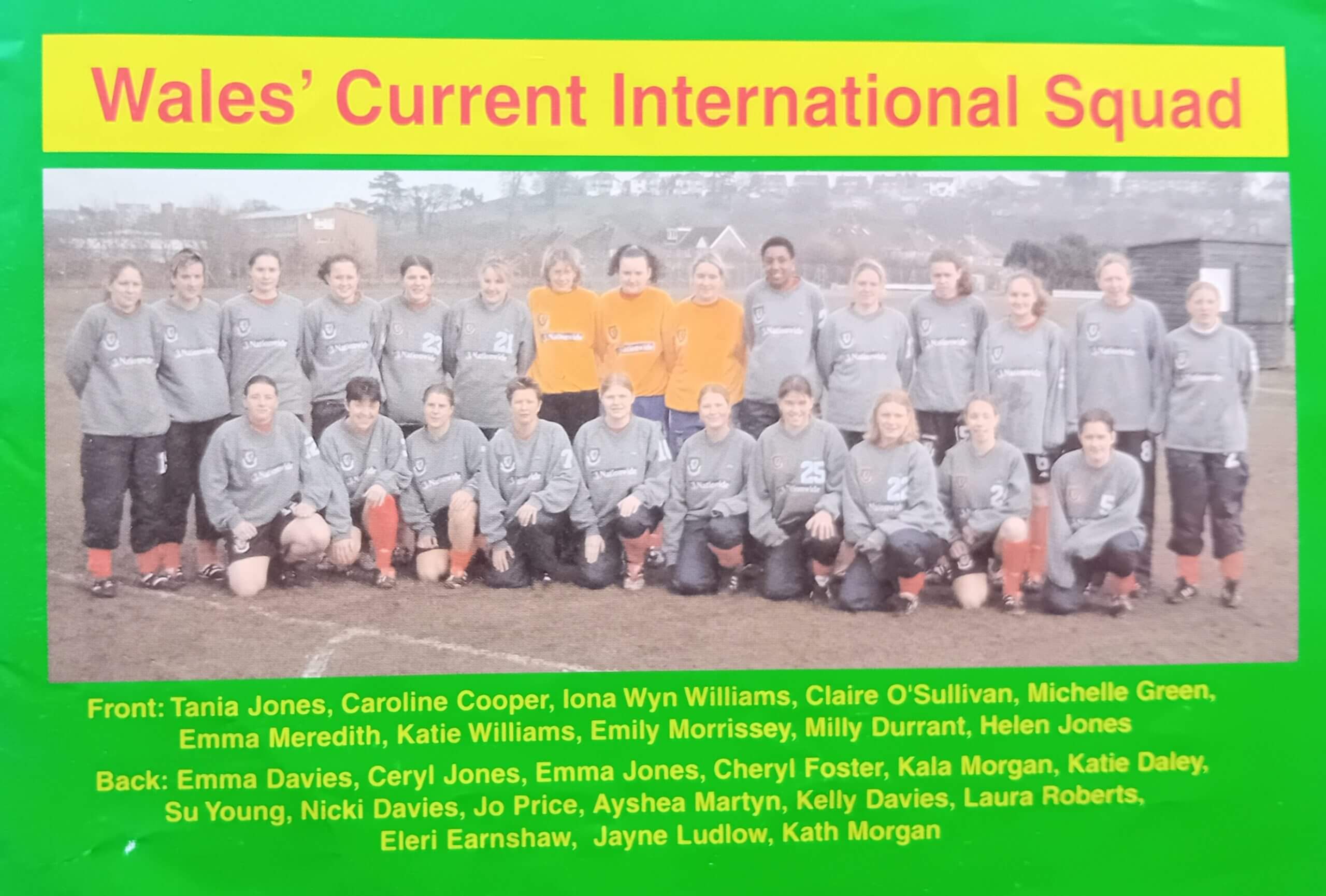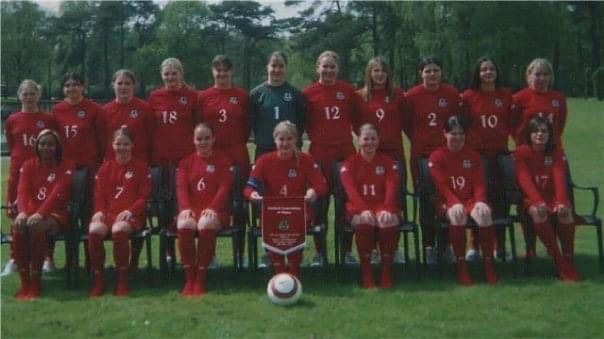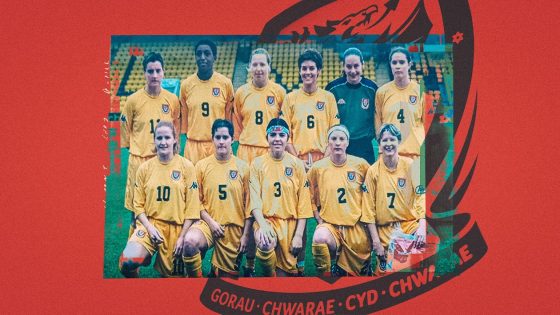Sian Williams remembers the swell of emotions like it was yesterday: frustration, frothing into anger, then fading into helplessness.
More than two decades have elapsed, but the thing that still gnaws at the former Wales Women head coach when she revisits the day her squad were pulled from their Euro 2005 qualifying campaign is the feeling she was never offered the full truth.
“I was disgusted,” Williams tells The Athletic. “In one way, it was par for the course at the time. As a woman in football, you’re so used to dealing with that sort of nonsense, but this was a real shock.”
England hosted the seventh Women’s European Championship that year, with three-time reigning champions Germany beating Norway 3-1 in the final. The eight-team tournament attracted an overall attendance of more than 117,000, setting national records and laying a foundation for the future.
Williams’ Wales were not among the eight sides to feature. Categorised as a Class B nation by UEFA due to their low ranking, Wales were ineligible to qualify for the finals (only UEFA’s 20 Class A teams could do so at the time, a format that remained in place until the expanded 12-team 2009 Euros).
While qualification was a non-starter, Wales, who had yet to make it to a major tournament, were drawn favourably in a Class B group alongside Belarus, Israel, Estonia and Kazakhstan. If Wales could win the group, it would mean promotion to Class A, thus making them eligible to qualify for the 2007 World Cup in China.
But then, one month before the Euros campaign was meant to commence in May 2003, the Football Association of Wales (FAW) scrapped their women’s team entirely as part of budget cuts.
Over 20 years later, Wales’ senior women’s team are still to qualify for their first major tournament. A two-leg Euro 2025 qualification play-off semi-final against Slovakia this week — with the winners then facing the Republic of Ireland or Georgia in a two-leg final in a month’s time — represents their best chance in that time.
But the events of 2003, and their impacts, remain largely unknown.
Wales fans of a certain vintage recall the early months of that year as a halcyon sanctuary from the misery they had become used to. Under manager Mark Hughes, Wales’ men’s team had topped their Euro 2004 qualifying group with four wins from four by March, including a 2-1 triumph over favourites Italy in Cardiff. A first major tournament since the 1958 World Cup felt like their destiny.
For Wales’ women’s team, however, those months are recalled with grimaces.
“It led me to retire from international duty for the first time,” says former Arsenal and Wales midfielder Jayne Ludlow. “I just thought, ‘What is the point of this? I’m taking my career seriously, I’m doing the best I can to be the best I can. This is a joke’.”
UEFA, European football’s governing body, fined the FAW 50,000 francs (around £23,000) for pulling the team from the qualification campaign four months after the draw in December 2002, the first offence of its kind for a UEFA member. No appeal was lodged, the argument being that the cost of going ahead with the matches outstripped the penalty.
Between March 2004 and March 2006, the Wales women’s team all but ceased to exist, playing just one friendly, against American university Kennesaw State’s women’s team. By the end of 2005, their ranking slipped to 57th, a record low.
When the side were revived for that 2007 World Cup qualifying campaign, “we were obviously a shambles,” says former international Gwennan Harries.
“I’m talking to you about this 20 years on, because so many people don’t know that it ever happened,” Williams says, allowing herself a chuckle. “There are so many stories I could catalogue over the years, another laughable chapter in the book: ‘You’ll never guess what happened!’ But that’s the way it was, unfortunately. Nobody was interested in listening then.”
The finger was always pointed at Kazakhstan.
Head coach Williams returned to Wales after an Algarve Cup competition in March 2003 and was met by a secretary with the news: her team would not compete in the Euro 2005 qualifiers kicking off in less than two months, with the FAW council deeming travel to and from group opponents Kazakhstan (4,000km/around 2,5000 miles each way) too expensive amid association-wide budget cuts.

Williams was never given an exact costing for that trip. Not that she expected to be. The FAW had only formally acknowledged the women’s team a decade earlier after lobbying from three players, despite their existence since 1973. Not until 2013 was a woman, Trish Turner, appointed to the body’s 28-member council, breaking 137 years of tradition.
“Most of the councillors were like, ‘OK, we’ll run a little bit of football for the girlies because that’s what we’ve got to do now’,” says Williams, who had been given the job of coach while still a star player for Arsenal, captaining their treble-winning side of 2000-01. “One or two councillors were actively hostile towards everything we did. I remember being spoken to by a senior person there who repeatedly called me ‘love’.”
For players, the news was devastating. The lack of a suitable budget in the preceding years made their removal now even more difficult to comprehend, as did the knowledge that council members also discussed travel and accommodation for themselves and their families in the event the men’s team qualified for Euro 2024 in Portugal. A source familiar with the meeting, who chose to remain anonymous to protect relationships, confirmed these conversations took place.
“Realistically, we knew we never stood a chance of qualifying, but it was about having the opportunity to play for our country,” says Katie Sherwood, who made her senior debut in 2002.
“Finances come into any element of sport, but there needs to be some give and take,” Williams adds. “Why is it that only women took the hit?”
Six months earlier, the FAW’s international committee had agreed a new full-time, four-year contract with Hughes, following Wales’ 2-0 win against Finland to begin their quest for a place in the Euros in Portugal.
Worth up to £2million ($2.6m) with an annual starting salary of £175,000, set to rise to £250,000 by 2006, the deal made the then 38-year-old the best-paid Wales manager in history, eclipsing predecessor Bobby Gould’s then-record £60,000 annual salary.
The FAW also signed off on chartered flights, better hotels, tailored squad blazers, strength and conditioning programmes and improved training facilities as Hughes attempted to salvage the reputation of a setup former Wales midfielder Gary Speed described as being like that of a “pub team”.
The overheads were steep, but former Wales and Manchester United striker Hughes’ pedigree helped in loosening historically tight council purse strings, as did the FAW’s improving financial health following his appointment. The newly-built 74,500-capacity then Millennium Stadium in Cardiff, used for home matches from the start of Hughes’ tenure in 2000, was regularly sold out for glamour friendlies against Brazil, Argentina and Germany, as well as crunch qualifiers.
According to accounts filed with Companies House, the FAW’s annual turnover grew from £1.86million in 1999 (before Hughes’ appointment) to £5.65m in 2004 (his final year as manager), while an operating loss of £274,802 grew into an operating profit of £1.28m.
In the same accounts, there is no mention of Wales Women being removed from the Euro 2005 qualification campaign, nor any suggestion of budget cuts.
The only reference to the senior women’s team in the 2003 accounts reads: “The women’s international team continue to struggle at the highest level. A very disappointing campaign in the Algarve Cup in Portugal ended with just two draws out of four matches.”
In November 2003, the FAW’s calculated gamble of supporting Hughes proved fruitless after a two-legged play-off final defeat against Russia, 1-0 on aggregate, meant the team had again failed to qualify for a major tournament.
The silence surrounding the women’s team’s fate was deafening but hardly shocking, says Williams.
Wales’ Western Mail newspaper ran the story angled on the fine the FAW incurred from UEFA and the irony that Hughes’ side anxiously awaited the same organisation’s decision on Azerbaijan’s fate in the group after the Group Nine minnows, whom Wales had beaten home and away, were suspended by the game’s global governing body FIFA for “repeated violations of their code of conduct”.
None of this stopped Williams from publicly denouncing the move. She questioned why Kazakhstan and Belarus — “third-world countries in financial terms” — could afford to put their teams into campaigns but not Wales, and what message that sent to aspiring footballers in the country.
Ludlow, undoubtedly the team’s highest-profile player, used her platform at Arsenal to highlight the team’s plight, but Williams insisted to her players that protests should be left to her.
“I said to them, ‘Don’t get yourself tarnished’,” says Williams. “Your playing career is a very finite thing, your opportunity at international level even less so. Men ran the sport, women had very little say. If you spoke up, you lost the boat. You were a troublemaker. I was very much pigeonholed as a troublemaker.”
Williams was never told how long the budget cuts would last, or if the team would be restored for the 2007 World Cup qualifying campaign. After fulfilling pre-arranged Algarve Cup fixtures in March 2004, Williams felt her resolve had been ground down to nothing.
“There’s no point in being manager of a team that doesn’t exist,” says Williams.
Ludlow announced her international retirement, after failing to be provided with assurances of future support.
Harries tells the story with a smile, but it does nothing to hide her indignation.
The former Everton defender can still remember Jess Fishlock’s face in April 2006 — unyielding, like steel. Then under-19s captain, she stood at a table in the north of the Czech Republic, reciting a thank-you note to three FAW councillors for inviting the team to dinner.

The meal was the first Harries recalls as being “edible” during the seven-day UEFA mini tournament Wales’ women were playing in.
“This was probably the first time I got really, really angry, a real burning inside,” Harries says. “Because it comes back to this idea of gratitude. We were representing our country. We were meant to be grateful. But we were staying in an army barracks. The councillors refused to stay there, that’s how bad it was. We didn’t see them until the final night of the trip. They were on a holiday, taking their wives out and spending god knows how much on FAW (credit) cards.
“We get one proper meal in a three-game tournament over the course of a week, and we’ve got to say thank you for it? At that point, I knew something still wasn’t right here.”
The memory of Fishlock from that night is at odds with the Fishlock of today: a driving force for women’s football in Wales, unafraid to call out poor standards.
“Today, Jess would be like, ‘First and foremost, we’re not staying at this hotel’,” Harries says of her team-mate, who famously took scissors to an ill-fitting, second-hand, long-sleeved men’s Wales shirt provided by the FAW for a 2009 Euro qualifier in 40C (104F) heat.
“But we saw what they did with the senior team (in 2003). We were afraid that saying anything or making a big hoo-ha would mean they’d do it again. Our role as females was to get on with it. So she ended up saying thank you.”
That same year, Harries and Fishlock made their senior competitive debuts against Moldova in a World Cup qualifier. The occasion was historic for the future, as Fishlock would become the country’s record caps holder (154) and goalscorer (45); but equally for the past, given it marked the official return of the senior women’s national team after more than two years.
But the memory of the team’s removal sat heavy. On the pitch, a near three-year absence from the qualifying stage left an already lagging women’s setup totally adrift of the sport’s leading nations.
“I can remember our first game back,” Harries says. “After a two-year break, we were obviously a sham. We hadn’t trained at all.”
Off the pitch, a sense of helpless gratitude pervaded everything. Adrian Tucker’s appointment as Williams’ replacement in 2006 led to call-ups for uncapped prospects in place of established players, such as ex-captain Claire O’Sullivan, creating discord between the generations.
“Their absences were more along the lines of, ‘These are the troublemakers, leave them out’,” says Ludlow, who retired for a second time after differences with Tucker. “We still weren’t given support, whether that was equipment, staff, facilities, expenses, performances. The culture still wasn’t appropriate, but even if we wanted to raise concerns, who would we raise the concerns with?”
The Athletic contacted the FAW regarding the issues raised in this article but it did not wish to comment.
The fight for equitable support raged for nearly two more decades. Not until 2018 was a first head of women’s football appointed (though the role is currently vacant, and has been since December 2023). Wales’ players did not have their names printed on the backs of their match shirts until 2019, with women-specific kits arriving a year later, while the team continued to train on rented pitches until 2021. Ludlow, who served as first-team manager from 2014 to 2022, also oversaw the under-17s and under-19s, jobs assigned to multiple full-time members of staff on the men’s side.
Progress has come from the sacrifice. More than £10million has been invested into women’s and girls’ football by the FAW in the past five years. Wales’ current number of registered female footballers reaches more than 11,000, doubling figures from 2017. In 2023, equal pay was confirmed for senior national teams. Forty per cent gender balance on the FAW’s board has been pledged for 2027.
This new generation now have the chance to qualify for a European Championship, an opportunity not afforded to those who went before them.
“There was some frightening talent in that era, but they didn’t have the resources to ever achieve what that squad was capable of,” says Sherwood. “They weren’t valued as footballers because it was all to do with money.”
(Top photo: The Wales women’s squad in 2002; design: Eamonn Dalton)





